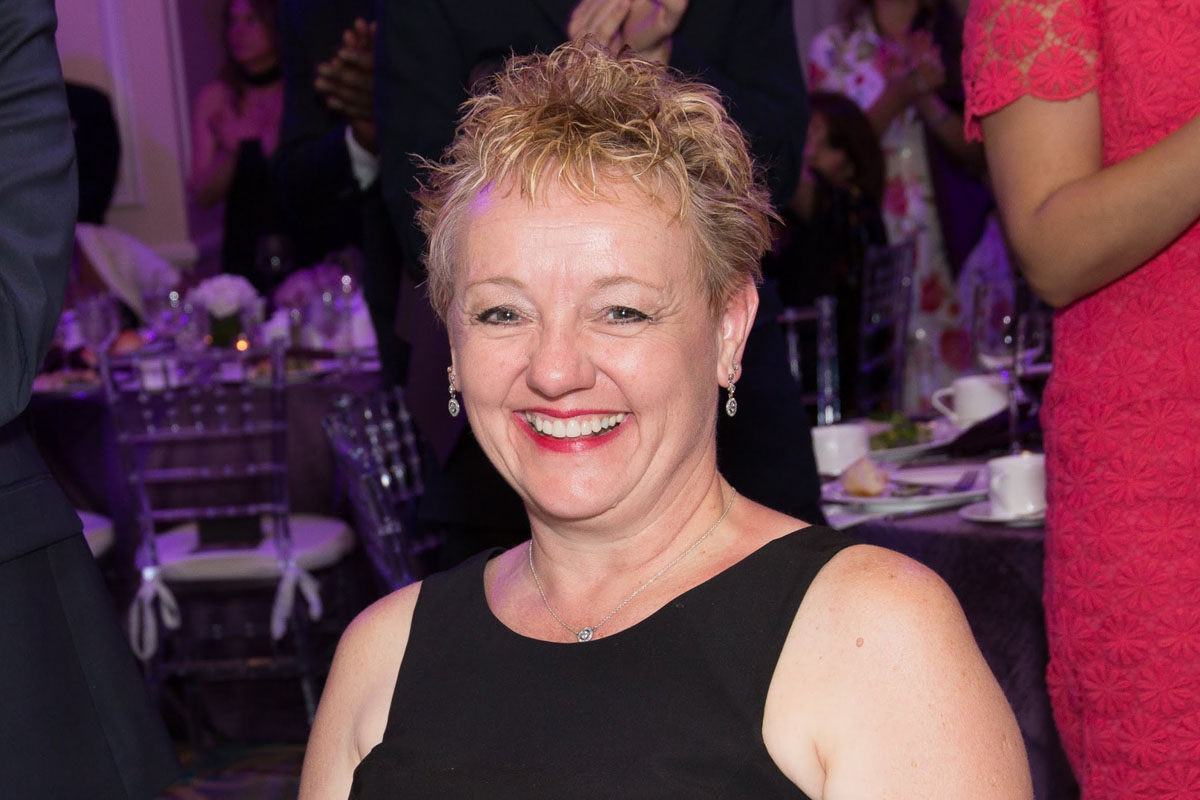HonorHealth Research Institute in Scottsdale Arizona

- Photo/Reba Saldanha August 25, 2018
- Photo/Reba Saldanha August 25, 2018
- Photo/Reba Saldanha August 26, 2018
JOYCE SCHAFFER: Clinical Trial Nurse Navigator
HonorHealth Research Institute in Scottsdale, Arizona
Written By Julia Brabant
May 2020
Clinical Trials Provide Hope, Options for Pancreatic Cancer Patients
Cancer-focused clinical trials drive transformative research by helping physicians determine what treatments are safe and effective. But for many pancreatic cancer patients, the biggest hurdle associated with them is finding out what trials exist, where they exist and whether they are eligible to participate.
So says Joyce Schaffer, MSN, RN, AOCNS, who works as a clinical coordinator and head nurse navigator at the HonorHealth Research Institute (a component of the HonorHealth Medical Centers) in Scottsdale, Arizona, an internationally recognized center known for its cancer and other research efforts. Particularly well-regarded for its extensive efforts to improve outcomes and quality of life for pancreatic cancer patients, HonorHealth maintains a variety of pancreatic cancer clinical trials. These trials are available for individuals of all stages of disease and can fit anywhere in a patient’s treatment journey.
A registered nurse for more than 35 years, 12 of which she spent focusing on research, Joyce brings a wealth of critical information to the table for today’s cancer patients. She became a nurse navigator, a term that originated in reference to those who helped breast cancer patients answer common questions and identify their options, after spending many years at patients’ bedsides. She now focuses primarily on the research side of nursing, virtually assisting patients from across the nation as they sort through their options and advocate for themselves.
Debunking Myths About Cancer Clinical Trials
Joyce notes that while there are numerous clinical trials that may be available to pancreatic cancer patients, many face barriers finding out about them. Others have misconceptions about the process and efficacy of those trials, while others yet feel as if signing on with one is an admission that he or she has reached the end of the road.
“You don’t need to be an HonorHealth patient to participate in clinical trials – that’s a common misconception,” Joyce said. “You also don’t have to exhaust all other available treatment methods before joining one. Some of our most promising clinical trials currently involve first-line treatments, which are the first treatments ever given to a patient for a particular disease.”
Another common myth about cancer clinical trials is that participants might receive placebos, or “sugar pills,” rather than actual effective medications.
“None of the clinical trials conducted through HonorHealth involve placebos,” Joyce said. “We provide active treatment for active diseases.”
As far as what patients can do to find out what clinical trials are actively available, Joyce recommends starting with questioning their oncologists.
“The biggest issue is a lack of awareness about options,” she said. “Only about 3% or 4% of adult cancer patients participate in clinical trials, while between 60% and 70% of pediatric cancer patients do so. Ask your oncologist about your options in this area right off the bat, because clinical trials can play a role at any point in a treatment plan.”
Joyce notes that she and other nurse navigators can also serve as points of contact for pancreatic cancer patients, regardless of where they reside. The nurse navigator job is largely a virtual one, enabling patients to explore their options from anywhere at any time. Recent world events involving COVID-19 have made virtual consultations even more commonplace in recent months.
You can visit the following clinical trial databases to find out about treatment in a clinical trial for individuals who are diagnosed with any stage of pancreas cancer, treated or untreated.
NIH Clinical Trials: ClinicalTrials.gov
Honor Health Clinical Trials: www.honorhealth.com/find-a-clinical-trial
Promising Clinical Trials for Pancreatic Cancer Patients
HonorHealth’s pancreatic cancer clinical trial database gives today’s patients a valuable resource they can use to explore available clinical trials and see whether they might meet eligibility requirements.
Currently, the database details four pancreatic cancer clinical trials that appear particularly promising, three of which cater to those with untreated Stage 4 pancreatic cancer. Details on these four specific trials are as follows:
- NCT03915444 – FIRST-LINE TREATMENT FOR STAGE IV ADENOCARCINOMA PANCREAS CANCER
INTRAVENOUS gemcitabine + cisplatin + Abraxane. - NCT03410030 – FIRST-LINE TREATMENT FOR STAGE IV ADENOCARCINOMA PANCREAS CANCER
INTRAVENOUS gemcitabine + Abraxane + cisplatin + ascorbic acid. - NCT03138720 – FIRST-LINE TREATMENT FOR LOCALLY ADVANCED/BORDERLINE RESECTABLE
ADENOCARCINOMA PANCREAS CANCER
INTRAVENOUS paclitaxel protein bound + gemcitabine + cisplatin + paricalcitol. - NCT02754726 – FIRST-LINE TREATMENT FOR STAGE IV ADENOCARCINOMA PANCREAS CANCER
INTRAVENOUS nivolumab + Abraxane + paricalcitol + cisplatin + gemcitabine.
HonorHealth’s Clinical Trial Database also details nine other pancreatic cancer clinical trials that may be available to patients, provided they meet predetermined eligibility requirements.
How Patients Can Advocate for Themselves
Regrettably, many of today’s pancreatic cancer patients don’t know to ask about clinical trials, and their doctors aren’t always proactive in mentioning them, either. A recent study suggests that the more a patient learns about clinical trials, the more likely he or she is to enroll in one.
“Yes; you have nurses and physicians working on your behalf, but you can’t always assume that they know all of the options that are available to you,” Joyce said. “You need to speak up for yourself when seeing your oncologist. Ask them if they have nurse navigators who can help you explore your options and otherwise navigate your treatment journey.”
In the event that they don’t, Joyce can virtually assist pancreatic cancer patients nationwide at any stage of their treatment journey.
“Clinical trials are what enable new treatments to make their way to patients,” she said. “Even when established treatments are available, clinical trials show us what we can do to reduce associated side effects and boost overall efficacy.”
Contact Joyce Schaffer at HonorHealth Research Institute: 480.323.1364 or email her at joschaffer@honorhealth.com.










